- Last Updated: December 16th, 2025
Key Takeaways
Individuals, especially parents of minors, who have suffered mental health issues due to TikTok's use can file a lawsuit for damages.
People must document any negative impacts on their mental health from using the app, like anxiety or depression, and show how TikTok contributed to these issues.
Those looking to file a lawsuit should gather evidence, calculate damages, and work with legal experts like Trulaw to explore options such as individual or class-action lawsuits.
Who Can File TikTok Mental Health Lawsuit?
On this page, we’ll discuss the TikTok Mental Health Lawsuit in further depth, potential damages in the social media harm lawsuit, who is eligible to file a TikTok Mental Health Lawsuit, and much more.
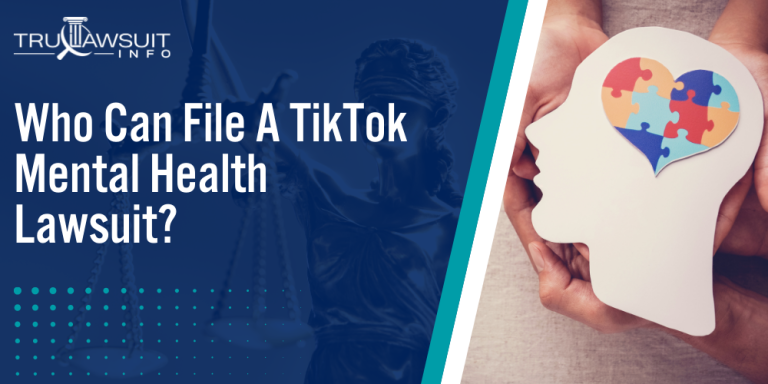
Intro to the TikTok Mental Health Lawsuit
Question: Who can file a TikTok Mental Health Lawsuit?
Answer: Individuals who have experienced mental health problems such as depression, anxiety, suicidal ideation, body dysmorphia, anorexia, or other eating disorders as a result of chronic use of social media platforms like TikTok may be eligible to file a TikTok Mental Health Lawsuit.
This is particularly applicable if a child’s mental health has worsened due to TikTok usage or if their daily life has been significantly impacted.
If you or a loved one have experienced mental health issues after developing a social media addiction, you may be eligible to file a lawsuit.
Contact TruLawsuit Info for a free consultation, or use the chatbot on this page for a free case evaluation to instantly see if you qualify for potential legal action.
Impact of TikTok on Youth Mental Health
The discussion surrounding TikTok’s influence on youth mental health has intensified, with concerns over its contribution to mental health struggles and the drive to explore the extent of its impact on young people.
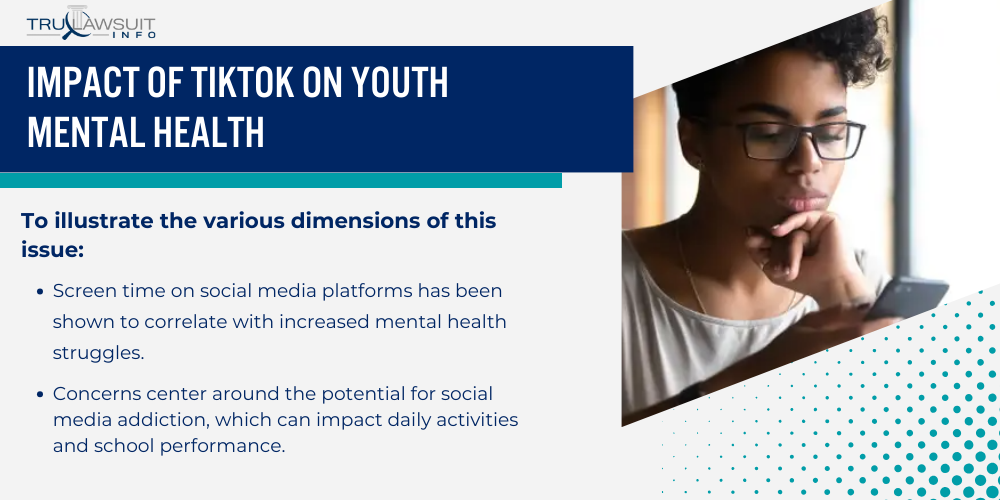
TikTok Usage and Adolescent Well-being
As young people engage with TikTok, a pattern of extensive screen time has been observed, raising questions about its effects on adolescent well-being.
To illustrate the various dimensions of this issue:
- Screen time on social media platforms has been shown to correlate with increased mental health struggles.
- Concerns center around the potential for social media addiction, which can impact daily activities and school performance.
- The role of TikTok in shaping perceptions and behavior through its algorithm has raised alarms.
- Youth mental health programs are increasingly considering the effects of excessive TikTok usage when designing interventions.
TikTok Mental Health Lawsuit: Youth Impact
The legal realm has seen efforts to protect children from the alleged adverse effects of TikTok usage, particularly concerning their mental health.
Pointers to these developments include:
- Cases where school districts ponder legal action in light of facilitating a safe online environment for their students.
- Lawsuits may argue that TikTok failed to protect children from content that could contribute to mental health struggles.
- The unfolding legal dialogue reflects a societal push to hold social media platforms accountable.
- Efforts to protect children through litigation emphasize the need for a safer digital landscape for young people.
TikTok and Mental Health Misinformation
The spread of misinformation about mental health on TikTok has become a controversial aspect of the platform’s role in public discourse.
With the ease of content sharing, inaccurate information can quickly gain traction among impressionable audiences.
Factors contributing to the rise of misinformation on TikTok include:
- Content creators lacking proper mental health credentials
- Algorithmic promotion of unverified mental health tips and diagnosis
- Viral trends that trivialize or inaccurately represent mental health conditions
- Challenges by mental health professionals to correct widespread falsehoods
Efforts to mitigate misinformation have resulted in an ongoing debate about social media’s responsibility to educate users while avoiding the inadvertent endorsement of unproven claims.
TikTok’s response to these concerns continues to evolve as it faces legal and societal pressure to foster a safer environment for discussions on mental health.
Legal Perspectives on TikTok Mental Health
TikTok’s influence on mental health has sparked significant legal scrutiny as individuals and regulatory bodies explore the potential for litigation and reform.
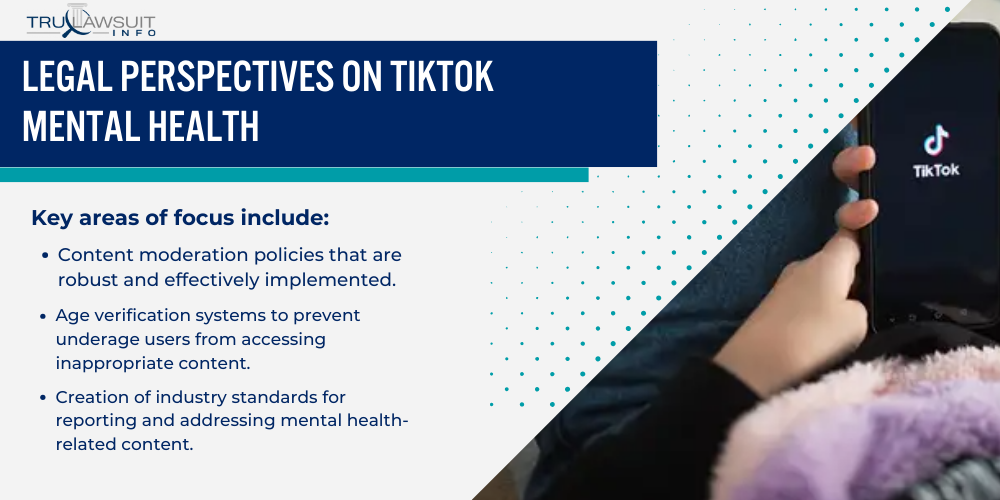
TikTok Mental Health Lawsuit: Legal Analysis
TikTok, a platform with billions of views, has had legal challenges arise from its impact on users’ mental health.
A noteworthy case involved wrongful termination claims from an aggrieved former employee.
Subsequent inquiries have focused on the platform’s effect on the mental health of its users, especially minors.
The legal entities are particularly concerned about holding tech companies like TikTok accountable.
Legal actions taken against TikTok have often been in the form of class-action lawsuits.
These lawsuits typically allege that the company has failed to provide industry-leading safeguards to protect users’ mental well-being.
Public nuisance laws have been considered as a possible avenue for holding the company liable for damages due to their alleged role in creating or exacerbating mental health issues.
Regulatory Measures for TikTok Content
Regulatory measures for content on platforms like TikTok ensure that companies remain accountable for the potential impact on users’ mental health.
Key areas of focus include:
- Content moderation policies that are robust and effectively implemented.
- Age verification systems to prevent underage users from accessing inappropriate content.
- Creation of industry standards for reporting and addressing mental health-related content.
- Government oversight to ensure that safeguards are not only promised but practiced consistently.
It is crucial to ensure that the implementation of regulatory measures includes collaboration with mental health experts to develop best practices for content management.
TikTok as a Platform for Mental Health Support
The rise of TikTok has led to the formation of various communities that offer support for mental health while legal debates continue on its role and influence on young users.
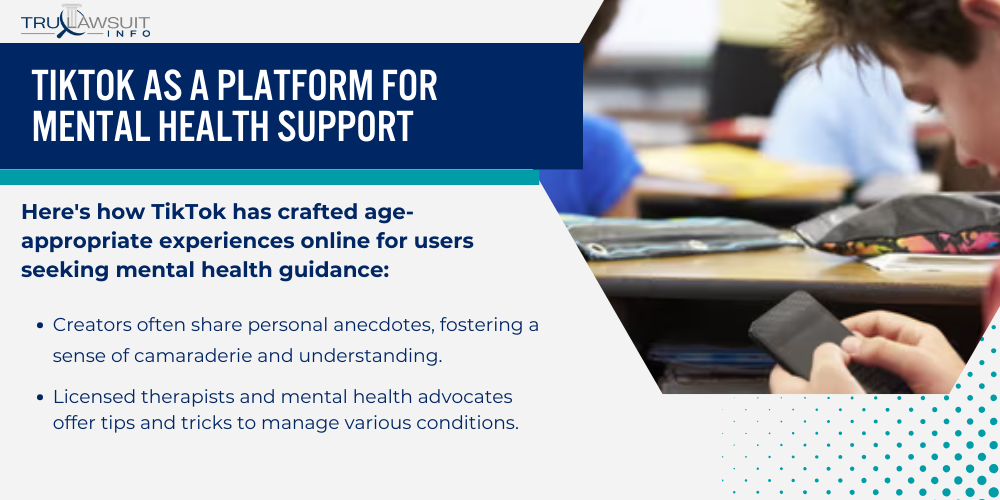
Mental Health Communities on TikTok
TikTok has become a refuge for many seeking mental health support, thanks to its vast and diverse user base.
The platform’s tailored algorithm allows individuals to connect with content that aligns with their personal struggles and recovery journeys.
This content ranges from coping strategies shared by individuals to professional advice provided by credentialed experts.
Here’s how TikTok has crafted age–appropriate experiences online for users seeking mental health guidance:
- Creators often share personal anecdotes, fostering a sense of camaraderie and understanding.
- Licensed therapists and mental health advocates offer tips and tricks to manage various conditions.
- School districts have begun to leverage TikTok to spread mental health awareness and provide support resources for students.
- Videos addressing eating disorders invite discussion and direct users to specialized assistance.
TikTok Mental Health Lawsuit: Supportive Role
Amidst the positivity, TikTok has faced legal scrutiny over its impact on users’ mental health.
Nonetheless, the platform’s potential supportive role in the mental health sphere is noteworthy.
The following points underscore TikTok’s involvement in tackling industry-wide challenges:
- TikTok has implemented features aimed at protecting mental health, including content warnings and in-app support links.
- Influencers and organizations on TikTok often host live sessions to discuss mental health, which aids in destigmatization efforts.
- Partnerships with mental health organizations can be frequently observed, reflecting a commitment to creating a supportive online environment.
- The platform’s efforts to curate age-appropriate experiences resonate in its community guidelines and content filters that protect younger users.
TikTok's Algorithm and Mental Health Effects
In the intersection of social media and mental health, TikTok’s algorithm plays a pivotal role in shaping user experiences, with rising concerns about its potential impact on well-being.
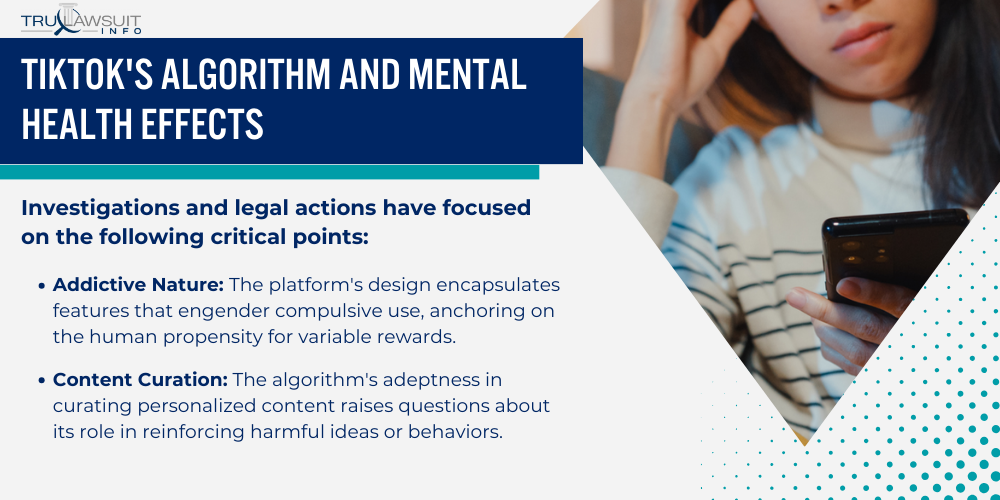
TikTok Mental Health Lawsuit: Algorithm Concerns
The algorithm of TikTok, operated by its parent company, ByteDance, has been under scrutiny in light of industry-wide challenges.
Investigations and legal actions have focused on the following critical points:
- Addictive Nature: The platform’s design encapsulates features that engender compulsive use, anchoring on the human propensity for variable rewards.
- Content Curation: The algorithm’s adeptness in curating personalized content raises questions about its role in reinforcing harmful ideas or behaviors.
- Algorithm Transparency: Litigations often highlight the opaqueness of TikTok’s content-recommendation algorithms, pressing for greater transparency.
- Regulatory Responses: The response of regulators and policymakers to these challenges holds significant implications for the platform’s operations and user protection.
Algorithmic Impact on TikTok User Mental Health
The influence of TikTok’s algorithm on user mental health over the past decade has become a pressing concern in the online world.
Here are several key impacts observed:
- Content Exposure: Users are often exposed to an unending stream of content, potentially leading to overuse and associated mental health challenges.
- Mental Health Disorders: There is a growing body of research highlighting a correlation between TikTok’s algorithm and the exacerbation of mental health issues.
- User Demographics: Younger users, a demographic heavily represented on TikTok, appear particularly susceptible to the negative mental health impacts of the platform’s algorithmic suggestions.
- Well-being Initiatives: ByteDance has undertaken measures to mitigate these effects, but the adequacy of these initiatives remains a topic of ongoing debate.
Research Insights on TikTok and Mental Health
The intersection of social media and mental health has become a growing area of concern, with TikTok at the heart of the conversation.
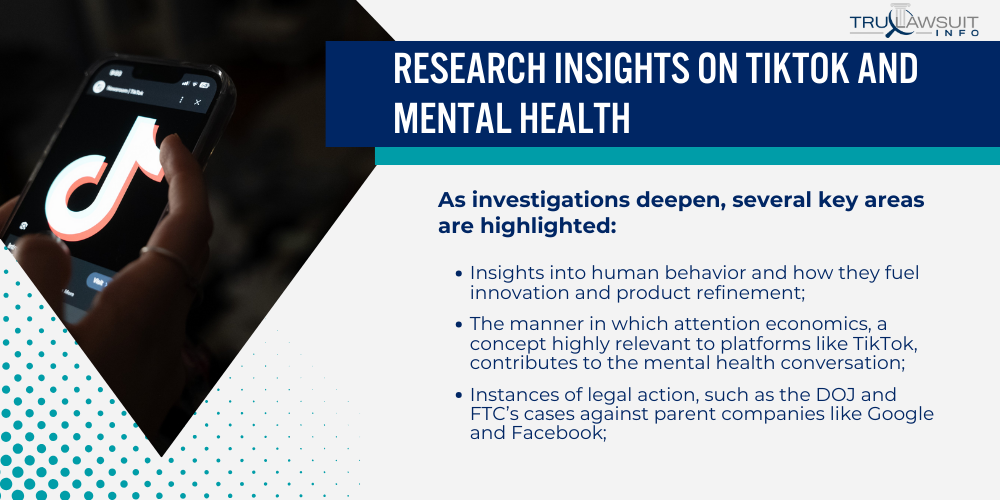
This platform’s unique blend of short-form video content and algorithmic predictions raises questions about its impact on users’ psychological well-being.
Studies on TikTok Mental Health Lawsuit
Robust research underlies the ongoing legal debates regarding TikTok and its effects on mental health.
One such exploration, conducted by a user under the pseudonym @kentucky_96, revealed intricate details of a bot mimicking human interactions on the platform, contributing to the discourse on TikTok’s role in users’ mental health issues.
Signs are emerging that litigation related to a mental health crisis allegedly caused by such platforms could increase.
The transformative potential of TikTok’s algorithm in influencing user behavior has also been a focal point of complex legal challenges.
As investigations deepen, several key areas are highlighted:
- Insights into human behavior and how they fuel innovation and product refinement;
- The manner in which attention economics, a concept highly relevant to platforms like TikTok, contributes to the mental health conversation;
- Instances of legal action, such as the DOJ and FTC’s cases against parent companies like Google and Facebook;
- Social media platforms’ responsibilities and emerging best practices regarding user well-being.
TikTok Mental Health Content: Academic View
Academics offer a crucial perspective on the nuanced relationship between TikTok and mental health.
An academic study published by Sage Journals examines TikTok therapists and their engagement with the concept they term “algorithmic imaginary,” highlighting the platform’s influence on mental health discourse.
Researchers have noted various aspects of TikTok’s influence:
- The accessibility of insights on patients’ mental health through user interactions and content;
- The challenges of untrained social media users discussing and possibly misinforming others on mental health treatment;
- The shift in future liability for social media platforms, with investigations into TikTok shining a spotlight on this issue;
- The litigious backdrop, where a recent lawsuit against a tech company could presage significant shifts in social media’s responsibility towards mental health.
These academic views and legal studies collectively underscore the urgency of reassessing traditional social media roles and the guiding principles that could form the basis of a new standard for platform operations concerning mental health in the digital age.
TikTok Mental Health Lawsuit and Public Policy
Policy Implications of TikTok Mental Health Issues
The challenges arising from TikTok’s platform involve ensuring safe and age-appropriate content, particularly as it relates to the mental health of its users.
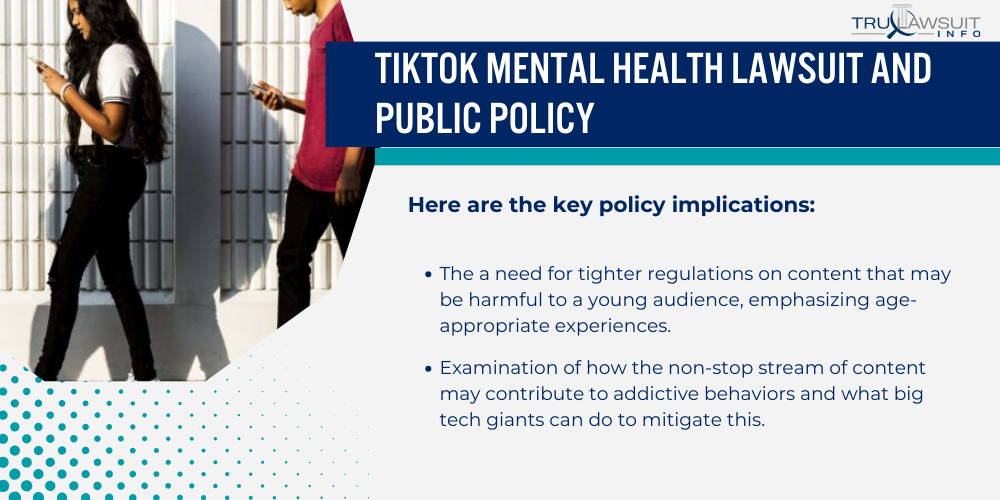
The persistent non-stop stream of content tailored by advanced algorithms has raised concerns.
In response, policymakers are considering various strategies designed to hold big tech companies accountable and protect online communities.
Here are the key policy implications:
- The a need for tighter regulations on content that may be harmful to a young audience, emphasizing age-appropriate experiences.
- Examination of how the non-stop stream of content may contribute to addictive behaviors and what big tech giants can do to mitigate this.
- Protecting the online community safe by implementing more robust content monitoring and reporting mechanisms.
- Identifying the challenges present in algorithmic decision-making, particularly those that impact user mental health.
TikTok Mental Health Lawsuit: Policy Responses
The unfolding TikTok mental health lawsuit has catalyzed responses from policymakers concerned with the broader implications of social media on mental health.
Several key policy responses demonstrate a proactive approach:
- Legislative efforts to enforce transparency from TikTok and other big tech companies regarding their content algorithms and user data usage.
- Proposals to establish minimum standards for community-safe practices in social media platforms.
- Implementation of age-appropriate experiences through stricter age verification processes and content filters.
- Programs aimed at educating users on the potential mental health risks associated with a non-stop stream of social media content.
Future of Mental Health Advocacy on TikTok
TikTok Mental Health Lawsuit: Future Directions
TikTok faces increased scrutiny over its impact on users’ mental health, leading to legal actions that could reshape the platform’s features and governance.
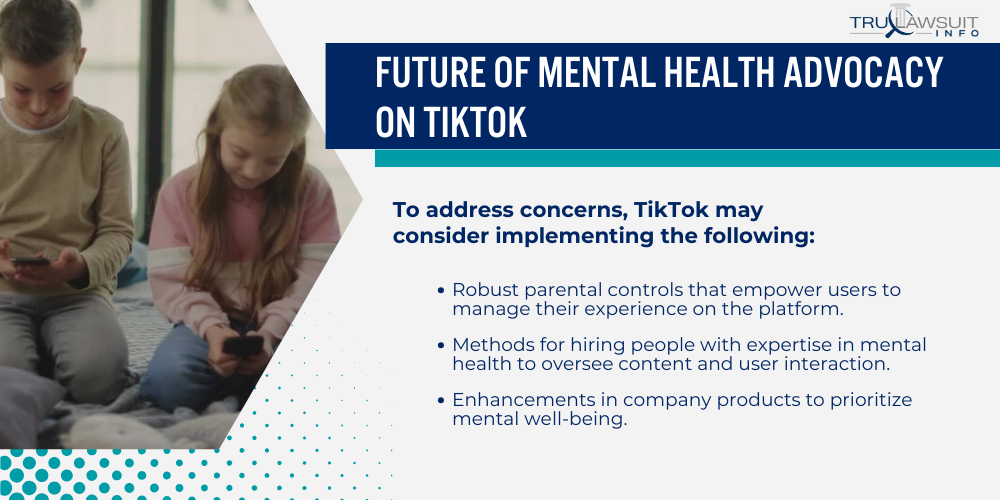
To address concerns, TikTok may need to implement:
- Robust parental controls that empower users to manage their experience on the platform.
- Methods for hiring people with expertise in mental health to oversee content and user interaction.
- Enhancements in company products to prioritize mental well-being.
- Strategies to understand emerging patterns in user behavior that could signal mental health issues.
Mental Health Advocacy Evolution on TikTok
TikTok has become a pivotal space for mental health advocacy, offering a platform where users can share their experiences and find community support.
With initiatives aimed at enhancing digital well-being, TikTok’s approach to mental health advocacy marks a significant shift toward more responsible social media consumption.
As the platform grows, mental health advocacy on TikTok is poised to evolve:
- The development of age-restricted features to protect younger users from content that could be harmful to their mental health.
- The introduction of settings to create a list of close friends provides a more controlled and supportive online environment.
- A commitment to regularly partner with mental health organizations to provide accurate information and resources.
- A modification to the algorithm that encourages passive scrolling, pointedly shifting towards a model that promotes active and meaningful engagement.
Frequently Asked Questions
-
To be eligible, individuals must typically show that they have suffered mental health issues as a direct result of using TikTok, such as anxiety, depression, or other emotional distress.
Evidence of using the platform and the correlation with deteriorating mental health is critical.
-
Claims against TikTok often center around the platform causing or exacerbating mental health conditions like anxiety, depression, eating disorders, or addictive behaviors.
Plaintiffs argue that TikTok’s algorithms and content can lead to these issues.
-
Filing a lawsuit requires a series of steps: firstly, documenting the mental health impact and TikTok usage, consulting with a qualified attorney, filing a legal complaint in the appropriate jurisdiction, and then preparing for potential court proceedings or settlement discussions.
-
Plaintiffs generally include individuals or the guardians of minors who can demonstrate that the defendant’s social media platform, in this case, TikTok, contributed significantly to a discernible mental health problem.
-
Evidence might encompass documented medical records and expert testimony on mental health impact.
It could also include proof of sustained platform use and any correlating data that links TikTok’s content or usage patterns with the claimed mental health issues.

Attorney Jessie Paluch, founder of TruLawsuit Info, has over 25 years of experience as a personal injury and mass tort attorney, and previously worked as an international tax attorney at Deloitte. Jessie collaborates with attorneys nationwide — enabling her to share reliable, up-to-date legal information with our readers.
Legally Reviewed
This article has been written and reviewed for legal accuracy and clarity by the team of writers and legal experts at TruLawsuit Info and is as accurate as possible. This content should not be taken as legal advice from an attorney. If you would like to learn more about our owner and experienced injury lawyer, Jessie Paluch, you can do so here.
Fact-Checked
TruLawsuit Info does everything possible to make sure the information in this article is up to date and accurate. If you need specific legal advice about your case, contact our team by using the chat on the bottom of this page. This article should not be taken as advice from an attorney.
You can learn more about the Social Media Harm Lawsuit by visiting any of our pages listed below:
Here, at Tru Lawsuit Info, we’re committed to helping victims get the justice they deserve.
To do this, we actively work to connect them with attorneys who are experts in litigating cases similar to theirs.
Table of Contents
Tru Lawsuit Info is a reliable source of information about issues that may affect your health and safety, such as faulty products, data breaches, and environmental hazards.
Our team of experienced writers collaborates with medical professionals, lawyers, and advocates to produce informative articles, guides, and other resources that raise awareness of these topics.
Our thorough research provides consumers with access to reliable information and updates on lawsuits happening around the country. We also can connect consumers with attorneys if they need assistance.
Here, at Tru Lawsuit Info, we’re committed to helping victims get the justice they deserve.
To do this, we actively work to connect them with attorneys who are experts in litigating cases similar to theirs.
